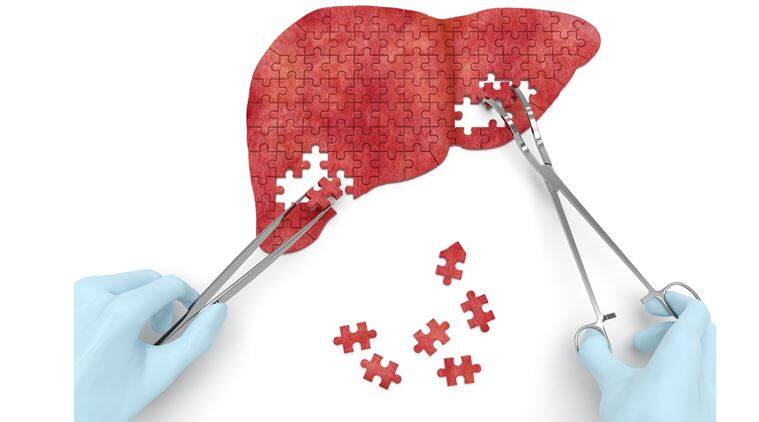The liver is likely the most underappreciated organ—and we think it deserves more recognition! After all, the liver is the largest internal organ in the body, weighing in at an impressive three to four pounds
It also plays many important roles like removing toxins from the body’s blood supply, maintaining healthy blood sugar levels, regulating blood clotting, and performing hundreds of other vital functions. The liver is also the only organ that can fully regenerate itself.
The primary functions of the liver involve the digestive system. It’s responsible for breaking down the food you eat into nutrients your body needs, storing some of these nutrients and turning the rest into essential chemicals. Anything that your liver thinks is toxic is expelled through your urine and feces. To help with this filtering system, the liver produces an important chemical called bile that helps break down what you ingest, especially fatty foods. But what happens when the liver becomes damaged or compromised from excess alcohol or a fatty diet? Simply put, it can’t efficiently process and eliminate these harmful substances.
Signs Your Liver Needs Help
Here are some clear signs that your liver is a stressed and could use a little rehab:
You’re excessively fatigued. Fatigue is a common symptom when the liver is under stress. When the liver is healthy, it converts the sugars you eat into glycogen, a form of sugar that can be stored and then later released as glucose when your body needs a burst of energy. But if the liver is overworked, it may become less efficient at regulating blood glucose. This can lead to fatigue and more sugar cravings than normal.
Your hormones are out of whack. The liver detoxifies more than chemicals and pollutants. It also detoxes your own hormones, including excess estrogen. When the liver is overworked, extra estrogen may not be excreted and can build up.
You have high levels of heavy metals. Exposure to heavy metals has exponentially increased since the 1950s due to an increased use of metals in industrial, agricultural, and technological applications. From textiles to electronics to paper processing and so much more, exposure to toxic metals like aluminum and mercury have become a part of everyday life. If the liver’s detoxification pathways are impaired, these heavy metals can accumulate in the body. When this occurs, the liver’s stores of glutathione—a powerful antioxidant that binds to metals so they can be elimiated—can become depleted. The resulting buildup of heavy metals can cause nausea, diarrhea, abdominal pain, weakness, and more. A comprehensive medical test can be run to see if your body’s heavy metal content is too high.
Liver-Loving Tips
Now that you know the warning signs, let’s take a look at some simple ways you can support your liver:
- Eat a low-fat diet. Fat, especially saturated fat, is hard for your liver to digest. If your diet contains high amounts of fat, your liver may not be able to keep up. This can put you at an increased risk of developing non-alcoholic fatty liver disease (NAFLD). Adopting a plant-forward diet is the best way to love your liver.
- Avoid excessive drinking. The liver can become overtaxed with the consumption of as little as two drinks in a short period of time. Excessive drinking over an extended period of time may lead to cirrhosis of the liver.
- Be careful with chemicals. Because your liver filters all toxins, including those absorbed through your skin, it’s smart to wear gloves when handling cleaning supplies, paint, or other chemicals. Your liver will thank you.
- Maintain a healthy weight. If you are obese or even somewhat overweight, weight loss can play an important role in preventing NAFLD. So get out there and break a sweat! Regular exercise helps burn triglycerides for fuel and can also reduce liver fat.
- Follow directions on all medications. Taking prescription and over-the-counter drugs incorrectly —for instance taking too much, the wrong type, or mixing medicines—can harm your liver. Never mix alcohol with drugs, even if they are not taken at the same time. Tell your doctor about any over-the-counter medications and supplements that you use.
- Incorporate a liver supplement. One last tip is to add a supplement to your routine that contains healthy nutrients for your liver. Aged Garlic Extract, for example, is a potent antioxidant rich in beneficial organosulfur compounds Studies have shown that it can also help fortify liver function thanks largely to an organosulfur compound called S-allyl cysteine.1 Milk thistle extract is also a great herb for liver support. Milk thistle’s most active compound is silymarin, a polyphenol with powerful antioxidant activity that scavenges damaging free radicals. It also boosts the activity of the body’s own antioxidants, such as glutathione.
A probiotic that contains digestive enzymes can also help to support liver function. The enzymes can assist the body’s natural ability to break down proteins, fats, carbohydrates, and dairy into absorbable nutritional elements, and can also regulate your body’s healthy bacteria and normalize your GI system.
A healthy liver means a healthy body overall. So it’s worth taking a few measures to optimize this organ’s function. Click here to read about more steps you can take to “love your liver.”
References
- Maeda T, Miki S, Morihara N, et al. Aged garlic extract ameliorates fatty liver and insulin resistance and improves the gut microbiota profile in a mouse model of insulin resistance. Experimental and Therapeutic Medicine. 2019; 18(1): 857-866.
This article is for informational purposes only. This article is not, nor is it intended to be, a substitute for professional medical advice, diagnosis, or treatment and should never be relied upon for specific medical advice.

Share this Post